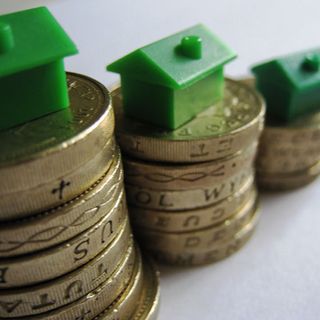Brexit house prices: what the experts say
Post-EU referendum, how real are the dire predictions for the UK housing market turning out to be? We round up the latest Brexit house price predictions


Remember those innocent pre-EU referendum days when life seemed so simple...
Should the unthinkable happen, said Chancellor George Osborne back in May, Brexit would usher in an 18% fall in house prices. Meanwhile estate agents warned of prices falling by £2,300 (£7,500 in London), property investors began including brexit clauses in commercial deals, letting agents saw the prospect of rents falling as private renters returned to the EU, and the commercial property sector predicted a loss in demand if companies relocated to other parts of the EU.
And that was even before you got to the effects of currency fluctuations and possible movements in the interest rate.
So now that Brexit is reality, was it all bluff and bluster? Here's a round up of the latest Brexit property news:
18 July 2016: London property prices are falling because of Brexit, says the Independent. The number of cuts to asking prices surged by 163 per cent in the 12 days following the referendum, according to figures from property research firm LondonRes. 'But the post-Brexit discounts have failed to encourage people to buy... The figures suggest that vendors understand they must drop asking prices to offload homes. Buyers, on the other hand, are more demanding as they want to secure deals that will protect them from a potential price fall.'
15 July 2016: Home-hunters have been negotiating discounts on property asking prices for some time, and vendors are now adjusting their expectations following the EU referendum, according to the Evening Standard. Paul Mahoney, managing director of property advisers Nova Financial, says: 'With the uncertainty in the market many buyers want a sweetener to make them feel more comfortable with making a transaction. Buyers should use this uncertainty and the slowdown in transactions to their advantage.' In May the average discount on the original asking price of a UK property was over £25,000 - up nearly £4,000 compared with January.
14 July 2016:
The Guardian reports on the Bank of England holding interest rates as 0.5%: 'The Bank put households on notice that a rate cut was certain if the economic situation failed to improve over the next month. In the minutes of its July meeting, the Monetary Policy Committee said that without a return to more normal conditions "most members of the committee expect monetary policy to be loosened in August". The Bank warned that it expects "sizable falls" in commercial property values in the coming months and also revised down the outlook for house prices.'
Get the Ideal Home Newsletter
Sign up to our newsletter for style and decor inspiration, house makeovers, project advice and more.
13 July 2016: Following the Council of Mortgage Lenders' monthly lending statistics for May, David Brown, CEO of estate agent Marsh & Parsons, comments: 'It is encouraging to see mortgage activity rebound in May after April's lull, which was primarily caused by landlords pausing for breath having raced to beat the Stamp Duty hike. What is particularly heartening is that first-time buyers have been able to capitalise on investors pulling back from the market, with almost 4,000 more purchasers able to take their first step on to the property ladder this May than in the same month last year. This tallies with what we've been seeing in the prime London market; that first-time buyers are making hay while the sun shines and taking advantage of decreased competition from would-be landlords.
'While the effects of Brexit are yet unknown, there is nothing to suggest that home loan activity will drop off too sharply. Indeed, for all the ambiguity that the Brexit may have brought, there is still encouragement for those thinking of buying and moving.' This was before the Bank of England held back on cutting interest rates as expected.
12 July 2016: The London housing market was at a complete standstill during the Brexit vote, reports the The Evening Standard and has started to slide according to the latest Asking Price Index compiled by property search website Home.co.uk. It is one of the first pieces of research published since the referendum, and suggests that the result tipped the London property market into reverse with asking prices down 1.1 per cent over the past month. 'It is too early to full appreciate the Brexit fallout for the UK property market, but the initial indications are certaintly worrying,' says Home.co.uk Director Doug Shepherd.
7 July 2016: Mortgage lender the Halifax has issued its latest house price statistics, showing that annual price growth slipped by 0.8% between May and June this year in the run up to the EU referendum vote. They predict that the pace could cool even further due to the exit result. According to the Halifax House Price Index, prices rose 1.3 per cent
in June as compared to May. However, year-on-year growth fell to 8.4 per
cent from 9.2 per cent in May. Halifax said the growth rate was down from 1.4 per cent in May
to 1.2 per cent in June. This figure was 1.5 per cent in April, 2.9 per
cent in March and 3.0 per cent in February. Martin Ellis, Halifax housing economist, said: 'There is evidence that the underlying pace of house growth may be easing. House
prices continue to increase, albeit at a slower rate, but this preceded
the EU referendum result, therefore it is far too early to determine
any impact since.'
6 July 2016:
Estate Agent Today reports on Bank of England governor Mark Carney's warning that 'conditions will be difficult' for future mortgage borrowers at some point over the life of their mortgages. 'Carney also says future interest rates may be downwards - which in theory would be good news for would-be buyers - but he also warns buyers to avoid high levels of debt.' Estate Agent Today quotes mortgage lender Bluestone Group's prediction that house price growth is 'likely to be moderate, particularly in London and the South East, reflecting the markedly lower consumer sentiment... and potentially the first signs of voluntary repatriation of EU nationals.'
4 July 2016: 'Before the EU referendum it was widely reported that property prices would substantially drop if the country was to vote to leave,' says Jerald Solis, Business Development and Acquistions Director at property investment consultancy Experience Invest. 'Now that brexit has been confirmed, most sectors of the property industry believe that not much will drastically change moving forward. It is yet to be proven that property prices will dip, but what is apparent is that brexit will open up certain opportunities that will potentially allow the sector to flourish.
'Domestic buyers may take a wait-and-see attitude, however we have seen overseas buyers snapping up the chance to buy UK property at a discounted price because of the current favourable exchange rates since the result was announced. Some investors are saving up to 10 per cent on their purchases.
'While domestic buyers may be inclined to be more cautious in times of economic uncertainty, the truth of the matter is the fundamentals remain the same. There is still a huge housing shortage in the UK and people still need somewhere to live, interest rates are likely to remain low and the government's promise to deliver more housing will not meet the required demand for the foreseeable future.
'The current environment may still not favour first-time buyers, as overseas investors swoop in to take full advantage of their currency gains. We may also find the amount of properties for sale declines while homeowners hold off from selling, however this will starve the market of property and could further drive prices higher given the supply will be further limited.
'As the UK property market is still reacting to the Leave vote it is still too early to fully determine the effect, but we have found it to have little effect so far. The UK property market has historically been deemed a safe haven by overseas investors, in both economic down-turns and times of prosperity, and we do not have any evidence that this will change.'
30 June 2016: Singapore's United Overseas Bank has stopped securing loans on London properties says The Guardian. Britain's decision to leave the EU has sent shockwaves around the world with investors fearful that brexit will trigger a new property crash as lower growth and uncertainty negatively affect the market.
30 June 2016: According to Property Week, investment deals that were well under way before the referendum 'are now under a cloud of uncertainty, with buyers expected to at least seek a renegotiation in price'. These include the sale of Mulberry's store on London's New Bond Street, Hines' Cannon Place in the City of London, a large Scottish shopping centre and Waverley Gate in Edinburgh. Lots of deals are being put on hold, says Property Week, or where there are brexit clauses they are being exercised.
29 June 2016: The Evening Standard offers some positive news for first-time buyers, pointing to a 'long, slow summer of business ahead' and lower house prices, with uncertainty in the market likely to continue until a new prime minister is appointed and probably beyond. The Standard quotes KPMG's prediction of a national five per cent fall in house prices, while London areas reliant on EU nationals, such as South Kensington and Angel, may well see price falls.
29 June 2016: Although the full impact of Brexit on the housing market is yet to be felt, says This is Money, theNationwide Building Society has reported that house prices did continue to rise in June - by 0.2%. Stats from the latest index from the bank show the average price of a property in the UK is now £204,968.
Image: Houses Going Down by Images Money is licensed under CC by 2.0

Heather Young has been Ideal Home’s Editor since late 2020, and Editor-In-Chief since 2023. She is an interiors journalist and editor who’s been working for some of the UK’s leading interiors magazines for over 20 years, both in-house and as a freelancer.
-
 5 things cluttering your home that can be turned into profit, according to This Morning's money-making expert
5 things cluttering your home that can be turned into profit, according to This Morning's money-making expertDan Hatfield sheds a light on 5 things in your house you probably had no idea could make you quite a bit of money
By Sara Hesikova
-
 Are you guilty of this bath mat drying mistake? This is what you should be doing with it between uses
Are you guilty of this bath mat drying mistake? This is what you should be doing with it between usesIt's time to rethink your drying routine
By Jullia Joson
-
 10 bedroom ideas for renters - how to make a rented bedroom look pretty without losing your deposit
10 bedroom ideas for renters - how to make a rented bedroom look pretty without losing your depositAdd flair and personality that is completely reversible
By Rebecca Knight